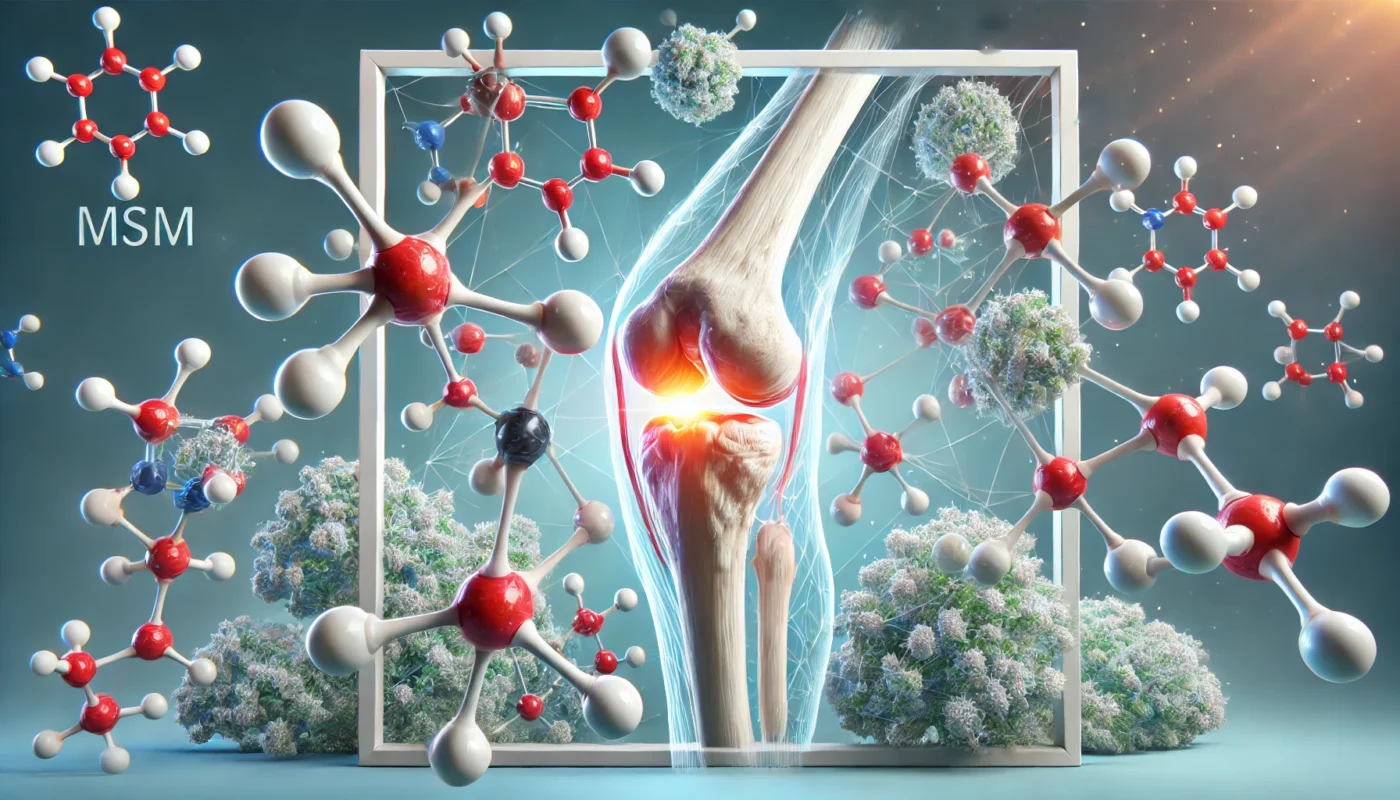Navigating the world of health supplements can be a daunting task. With a myriad of options available, it’s crucial to understand what each supplement offers.
In the realm of joint health, three supplements often stand out: glucosamine, chondroitin, and MSM. These compounds are frequently used to manage conditions like arthritis and to support overall joint health.
But what are the key differences between them?
This article aims to demystify these supplements. We’ll delve into the science behind glucosamine, chondroitin, and MSM, and explore their potential benefits and drawbacks.
We’ll also compare these supplements head-to-head. This will help you understand which might be the best fit for your health goals and lifestyle.
Whether you’re a fitness enthusiast, a health-conscious individual, or a patient seeking to manage a specific condition, this article is for you.
Let’s embark on this journey to better understand glucosamine, chondroitin, and MSM, and their roles in promoting joint health.
You May Also Like: Natural NSAIDs: Benefits and Side Effects
Understanding Glucosamine, Chondroitin, and MSM
To fully appreciate the benefits of glucosamine, chondroitin, and MSM, it’s essential to understand what each compound entails. These three are often discussed in the same context because they share a common goal: enhancing joint health. Yet, they differ in origin and function.
Glucosamine is well-known for its role in cartilage formation and repair. It’s a natural substance found in the human body and key to maintaining joint health. Meanwhile, chondroitin also supports cartilage, primarily by helping it retain water. This ensures the cartilage remains flexible and capable of absorbing shocks. MSM, or methylsulfonylmethane, is an organic sulfur compound believed to reduce inflammation and pain.
Let’s break down these compounds further:
- Glucosamine: Often derived from shellfish shells, supports cartilage repair.
- Chondroitin: Typically sourced from animal cartilage, aids in water retention in cartilage.
- MSM: Found in plants and animals, often lab-produced for supplements, known for anti-inflammatory properties.
Each compound brings unique benefits and has been extensively studied for joint health applications.
What is Glucosamine?
Glucosamine is a naturally occurring compound in the body, especially in cartilage. It plays a pivotal role in building and repairing this critical tissue. Typically, glucosamine supplements are sourced from the shells of shellfish, though vegetarian versions are also available.
It is often used to support joint health and may be beneficial for those with osteoarthritis. Its primary function is to aid in the production of glycosaminoglycans, which are integral for cartilage structure and repair.
Research on glucosamine is mixed. Some studies show potential for reducing joint pain and improving mobility, while others suggest no more benefit than placebo. It’s important to note that the effectiveness might vary based on the form of glucosamine used, such as glucosamine sulfate versus glucosamine hydrochloride.
What is Chondroitin?
Chondroitin is another compound critical to maintaining healthy cartilage. It’s often combined with glucosamine in supplements, as they are believed to have a synergistic effect. This supplement is usually derived from bovine or shark cartilage, though there are vegetarian alternatives.
Its main role is to help cartilage retain water, providing necessary cushioning in the joints. By doing so, it aids in reducing friction during movement and potentially slowing cartilage breakdown. This function is particularly beneficial for individuals with arthritis, where cartilage degenerates over time.
Studies on chondroitin have shown varied results. While some people experience significant joint pain reduction, others find little to no change. The body’s ability to absorb chondroitin is generally lower than that of glucosamine, which might impact its effectiveness.
What is MSM (Methylsulfonylmethane)?
MSM stands for methylsulfonylmethane, a compound containing sulfur that is naturally present in plants and animals. Sulfur is a vital mineral in the body, playing an essential role in protein synthesis and joint health.
Unlike glucosamine and chondroitin, MSM is often synthesized in a laboratory. It is popular for its anti-inflammatory and pain-relieving properties, making it a common addition to joint health supplements. Some studies suggest it could improve arthritis symptoms by reducing swelling.
MSM’s benefits are not limited to joint health alone. It has been investigated for additional benefits, such as enhancing skin health and reducing allergies. However, as with other supplements, more research is necessary to fully understand its broad range of potential effects.

The Science Behind Joint Health Supplements
Joint health supplements, including glucosamine, chondroitin, and MSM, have sparked widespread interest for their potential to alleviate joint discomfort. Understanding the science behind these compounds helps clarify their potential effects on the body.
Glucosamine is believed to aid in the synthesis of compounds known as glycosaminoglycans. These are critical for maintaining cartilage structure. By providing building blocks for cartilage, glucosamine could help with repair and maintenance.
Chondroitin, on the other hand, is thought to promote cartilage hydration. It binds to water, thus enhancing the cartilage’s flexibility and shock-absorbing abilities. This property might delay cartilage deterioration in degenerative joint diseases.
MSM’s role is mainly associated with its anti-inflammatory properties. By reducing inflammation, MSM may alleviate pain and swelling. Additionally, the sulfur in MSM is essential for forming collagen and glucosamine.
Key functions of these supplements include:
- Cartilage Repair: Facilitated by glucosamine.
- Cartilage Hydration: Enhanced by chondroitin.
- Inflammation Reduction: Achieved through MSM.
The synergy of these supplements potentially offers comprehensive joint support. However, efficacy can vary from individual to individual, influenced by factors like dosage and individual health conditions.
How Do These Supplements Work?
Supplements targeting joint health primarily operate by addressing different aspects of joint function and condition. Glucosamine’s core action involves stimulating the production of substances that maintain cartilage integrity. By supplying additional glucosamine, the body may bolster its ability to repair cartilage effectively.
Chondroitin works within the cartilage matrix to prevent breakdown. It supports shock absorption by retaining water in the cartilage, which cushions the joints during movement. This cushioning effect can reduce wear and tear, beneficial for individuals with arthritis.
MSM’s mechanisms are notable for inflammation mitigation. The sulfur content in MSM supports collagen synthesis, contributing to the structural integrity of joints and connective tissues. By addressing inflammation, MSM may also reduce the associated pain and stiffness.
These supplements do not work immediately and require consistent use for potential benefits. The body’s response can depend on various factors, including the severity of joint conditions and overall health.
Analyzing the Research: Efficacy and Outcomes
Research into glucosamine, chondroitin, and MSM has yielded mixed results. Some clinical studies indicate potential benefits, while others find limited or no effects beyond placebo. This discrepancy highlights the complexity of supplement efficacy across diverse populations.
A significant portion of research focuses on glucosamine and chondroitin’s role in osteoarthritis. Some trials show these supplements may relieve moderate to severe knee pain. However, others suggest the effects are not significantly different from placebo treatments.
MSM has been studied for its anti-inflammatory properties and its potential role in reducing arthritis symptoms. Some findings indicate it can improve joint flexibility and decrease pain, but more extensive research is necessary.
Overall, the effectiveness of these supplements remains an area of active investigation. While some individuals may experience notable relief, others may see little improvement. This variability calls for personalized approaches and further research into ideal dosing and combinations.
Comparing Glucosamine vs. Chondroitin vs. MSM
When comparing glucosamine, chondroitin, and MSM, it’s important to understand their unique roles in joint health. Each of these supplements offers distinct benefits due to their specific functions.
Glucosamine is a compound that assists in the formation and repair of cartilage. It serves as a building block for developing cartilage structure, providing a foundation for joint stability.
Chondroitin is known for its ability to retain water in cartilage, which enhances joint resilience. It helps cushion joints, reducing the impact of daily activities and potentially slowing cartilage breakdown.
MSM stands out for its anti-inflammatory properties. By offering sulfur, it aids in collagen production, improving connective tissue support. Its potential to reduce inflammation and pain makes it a versatile supplement.
Here is a brief overview of how these supplements differ:
- Glucosamine: Supports cartilage formation and repair.
- Chondroitin: Promotes cartilage hydration and shock absorption.
- MSM: Alleviates inflammation and supports collagen synthesis.
Each supplement’s specific focus contributes to overall joint health, but their combined use may provide synergistic benefits.
Absorption and Bioavailability
Understanding how the body absorbs these supplements is crucial. Bioavailability refers to the extent and rate at which a substance is absorbed into the bloodstream.
Glucosamine, particularly in its sulfate form, generally shows higher bioavailability compared to its hydrochloride variant. This means glucosamine sulfate is more readily absorbed, potentially leading to more effective results.
Chondroitin’s absorption is notably lower than glucosamine. Its large molecular size can hinder efficient uptake, meaning a significant portion may not be used by the body.
MSM, however, has a relatively high absorption rate. This ensures it reaches the bloodstream promptly, making it potentially more effective at providing quick relief.
Efficient absorption of these supplements can influence their efficacy, but individual differences in metabolism and health conditions may also play a role.
Effectiveness for Joint Pain and Arthritis
The effectiveness of these supplements for joint pain and arthritis varies widely among individuals. Studies suggest glucosamine may provide relief for those with moderate to severe knee osteoarthritis. It has shown promise in reducing pain and improving joint function.
Chondroitin is often paired with glucosamine in studies to assess its impact on joint health. Some evidence indicates it can contribute to reduced pain and enhanced function, particularly in knee osteoarthritis patients.
MSM is valued for its anti-inflammatory properties, which can alleviate pain and stiffness associated with arthritis. Preliminary research supports its use, but more studies are needed to confirm its long-term efficacy and safety.
While each supplement has its strengths, effectiveness often depends on the severity of arthritis, individual response, and adherence to recommended dosing.
Side Effects and Interactions
While generally considered safe, glucosamine, chondroitin, and MSM can cause mild side effects. Common issues include gastrointestinal discomfort, such as nausea and diarrhea, especially with higher doses.
Individuals allergic to shellfish should approach glucosamine cautiously, as it’s typically derived from shellfish. Alternatives exist but should be discussed with a healthcare provider.
Chondroitin may interact with blood thinners, increasing bleeding risk. Those on anticoagulation therapy should consult a doctor before use.
MSM is usually well-tolerated, but its long-term effects are not well-documented. Starting any supplement regimen should involve consultation with a healthcare professional, particularly when managing existing health conditions or potential interactions with other medications.

Practical Advice for Supplementation
Choosing the right joint health supplement requires a thoughtful approach. It’s essential to consider how each component fits into your personal health plan. Balancing your diet and lifestyle with appropriate supplementation can enhance results.
Let’s explore some practical tips for using glucosamine, chondroitin, and MSM effectively.
- Evaluate Personal Needs: Consider health conditions and goals.
- Research Brands: Choose reputable brands for quality assurance.
- Monitor Health Changes: Keep track of any improvements or side effects.
- Consult Healthcare Professionals: Seek advice for personalized guidance.
By following these guidelines, you can make informed decisions that align with your health objectives.
Dosage and Duration of Use
Finding the right dosage for glucosamine, chondroitin, and MSM is crucial. It’s important to start with the manufacturer’s recommended dose or a healthcare provider’s suggestion.
For glucosamine, typical doses range from 1,500 mg to 2,000 mg daily, while chondroitin is usually taken at about 800 mg to 1,200 mg. MSM dosages can vary from 1,000 mg to 3,000 mg per day.
Duration depends on individual response. Some may notice benefits in a few weeks, while others may need several months. Consistency is key to seeing results, and it’s crucial to adjust based on how your body responds.
Quality and Sources of Supplements
Quality is paramount when selecting supplements. Not all supplements are created equal, so choosing the right source is essential for safety and effectiveness. Look for products that have been third-party tested, which can assure purity and potency.
Consider the origin of the active ingredients. Glucosamine is often derived from shellfish, but vegan options are available. Chondroitin typically comes from animal cartilage, requiring attention to sourcing if dietary restrictions exist.
Researching companies’ reputations and reading reviews can provide insights into product quality. It’s important to invest in supplements that prioritize ethical sourcing and environmentally responsible production practices.
Lifestyle Considerations and Holistic Approaches
Incorporating supplements into your routine should complement a healthy lifestyle. Beyond supplementation, diet and exercise play pivotal roles in joint health.
A comprehensive approach might include:
- Balanced Diet: Include anti-inflammatory foods like leafy greens and fatty fish.
- Regular Exercise: Engage in low-impact activities like swimming or cycling.
- Weight Management: Maintain a healthy weight to reduce joint stress.
- Adequate Rest: Ensure proper sleep and stress management.
Additionally, consider integrating holistic practices like yoga or meditation. These can help improve flexibility and reduce stress, benefiting joint health indirectly. By adopting a well-rounded approach, you can support your joints and overall wellbeing effectively.
Real-World Applications and User Experiences
Understanding how glucosamine, chondroitin, and MSM perform in real-world settings offers valuable insight. Many individuals turn to online reviews and personal testimonials to guide their decisions. These firsthand accounts can highlight the potential benefits and limitations of these supplements.
Users often report improvements in joint mobility and reduced discomfort. However, experiences vary significantly from person to person, emphasizing the importance of personalized approaches.
Here are some common themes from user experiences:
- Varied Effectiveness: Benefits range from mild relief to significant improvement.
- Initial Reluctance: Some users are skeptical before noticing results.
- Onset of Benefits: Experiences indicate differing timelines for positive effects.
- Side Effects: Mostly mild and include stomach upset or allergic reactions.
Ultimately, while user reviews provide a broader view, individual responses should guide expectations and supplement choices.
Glucosamine Chondroitin Reviews and Testimonials
User reviews of glucosamine chondroitin supplements often highlight changes in quality of life. Many note gradual improvements in joint flexibility and a decrease in pain. These outcomes motivate continued use despite varying onset times.
Nevertheless, some users report minimal to no changes. This underscores the role of unique physiological factors. Reviews often mention the mild nature of side effects, such as gastrointestinal discomfort, indicating a generally favorable tolerance.
For those seeking testimonials, it’s vital to approach them as one part of a comprehensive research process. While reviews are subjective, they can complement scientific findings to create a fuller picture of potential benefits.
Athletes and Fitness Enthusiasts’ Perspectives
Athletes and fitness enthusiasts frequently adopt joint health supplements like glucosamine, chondroitin, and MSM. They often seek to maintain joint integrity and hasten recovery. These users value supplements that can support demanding training routines.
Feedback from this group frequently highlights enhanced endurance and reduced soreness. Many athletes notice joint resilience, allowing them to engage in high-intensity activities with less discomfort. However, just like general users, athletes experience mixed results.
Some fitness enthusiasts advocate for holistic practices along with supplementation. Strategies such as balanced nutrition and targeted exercises are vital to their success. These perspectives emphasize a multi-faceted approach to joint health, integrating both supplements and lifestyle adjustments for optimal outcomes.

Conclusion and Final Thoughts
Glucosamine, chondroitin, and MSM offer promising, albeit varied, benefits for joint health. Their effectiveness depends greatly on individual differences and health conditions. While they may provide relief for some, they are not a one-size-fits-all solution.
For those considering supplementation, a holistic approach is essential. This includes consulting healthcare providers, maintaining a balanced diet, and engaging in regular physical activity. By combining these strategies, individuals can make informed decisions that best support their joint health and overall wellbeing.
Further Reading:
Cleveland Clinic: Glucosamine; Chondroitin Capsules or Tablets
Verywell Health: How Much Glucosamine Chondroitin Should You Take?
National Library of Medicine: Comparison of Glucosamine-Chondroitin Sulfate with and without Methylsulfonylmethane in Grade I-II Knee Osteoarthritis: A Double Blind Randomized Controlled Trial
glucosamine, chondroitin, MSM, joint health, supplements, dietary supplements, health advice, wellness, fitness, anti-inflammatory, holistic health, user experiences, athlete recovery, dosage, supplement quality, lifestyle changes, health conditions, personal health plan
Important Note: The information contained in this article is for general informational purposes only, and should not be construed as health or medical advice, nor is it intended to diagnose, prevent, treat, or cure any disease or health condition. Before embarking on any diet, fitness regimen, or program of nutritional supplementation, it is advisable to consult your healthcare professional in order to determine its safety and probable efficacy in terms of your individual state of health.
Regarding Nutritional Supplements Or Other Non-Prescription Health Products: If any nutritional supplements or other non-prescription health products are mentioned in the foregoing article, any claims or statements made about them have not been evaluated by the U.S. Food and Drug Administration, and such nutritional supplements or other health products are not intended to diagnose, treat, cure, or prevent any disease.

